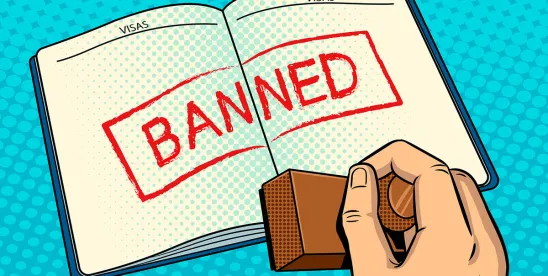On June 4, 2025, President Donald Trump signed an Executive Order restricting the entry of certain foreign nationals to the United States, with the purported goal of protecting the United States from foreign terrorists, as well as other national security and public threats. (Read the proclamation here: Restricting The Entry of Foreign Nationals to Protect the United States from Foreign Terrorists and Other National Security and Public Safety Threats – The White House.)
The travel restrictions took effect on June 9, 2025, at 12:01 a.m. Only those individuals who are outside the United States on this date and who do not already hold a valid nonimmigrant or immigrant visa for entry to the United States are affected. Visas issued to these individuals will not be revoked pursuant to this proclamation.
These restrictions will be first reviewed after 90 days (on September 7, 2025) and then will be reviewed every 180 days thereafter to determine whether the restrictions should be continued, terminated, or modified, or if additional travel restrictions should be imposed.
COMPLETE RESTRICTION OF ENTRY TO THE UNITED STATES
Individuals who have passports from the following countries are generally restricted from applying for admission to the U.S. either as a nonimmigrant (i.e., in any nonimmigrant visa category such as B-1/B-2, F-1, H-1B, L-1, etc.), or as an immigrant (i.e., as a permanent resident), subject to certain exceptions:
- Afghanistan
- Burma
- Chad
- Republic of the Congo
- Equatorial Guinea
- Eritrea
- Haiti
- Iran
- Libya
- Somalia
- Sudan
- Yemen
PARTIAL RESTRICTION OF ENTRY TO THE UNITED STATES
Individuals who have passports from the following countries are generally restricted from applying for admission to the United States, if they are applying for entry to the United States with either an immigrant visa or with a non-immigrant visa within one of the categories identified below:
- Burundi: Suspension of entry on B-1, B-2, B-1/B-2, F, M, and J visas
- Cuba: Suspension of entry on B-1, B‑2, B-1/B-2, F, M, and J visas
- Laos: Suspension of entry on B-1, B‑2, B-1/B-2, F, M, and J visas
- Sierra Leone: Suspension of entry on B-1, B-2, B-1/B-2, F, M, and J visas
- Togo: Suspension of entry on B-1, B‑2, B-1/B-2, F, M, and J visas
- Turkmenistan: Suspension of entry on B-1, B-2, B-1/B-2, F, M, and J visas
- Venezuela: Suspension of entry on B‑1, B-2, B-1/B-2, F, M, and J visas
Individuals from Egypt may also be included in future revisions to the travel restrictions.
EXCEPTIONS TO TRAVEL RESTRICTIONS
The U.S. Attorney General can make a case-by-case exception to permit individuals from countries on these lists to enter the United States, if the individual’s travel would advance a critical U.S. national interest, including if the individual is required to participate in criminal proceedings as a witness.
INDIVIDUALS EXEMPT FROM TRAVEL RESTRICTIONS
The travel restrictions do not apply to the following individuals:
- Permanent Residents of the United States (i.e., “green card holders”)
- Dual nationals who have a second passport from a country that is not listed in the proclamation, and who present the unaffected passport when applying for admission to the United States.
- Visa holders in any of the following categories: A-1, A-2, C-2, C-3, G-1, G-2, G-3, G-4, NATO-1, NATO‑2, NATO-3, NATO-4, NATO-5, or NATO-6 (i.e., diplomats)
- Athletes applying for entry to the United States to participate in the World Cup, Olympics, or other major sporting event.
- Immediate relatives of U.S. Citizens (spouse, unmarried child under 21 years of age, or parent of a U.S. citizen (if the U.S. citizen is 21 years of age or older). Immediate relatives must have immigrant visas in the following categories: IR-1/CR-1, IR-2/CR-2, IR-5)
- Adopted children who have immigrant visas in the following categories: IR-3, IR-4, IH-3, IH-4)
- Afghan Special Immigrant Visa holders
- U.S. government employees with Special Immigrant Visas
- Ethnic and religious minorities facing persecution in Iran with Immigrant visas
- Individuals already granted asylum, refugees admitted to the United States, and individuals granted withholding of removal under the Convention Against Torture (“CAT”).
The Proclamation does not limit the ability for individuals to seek asylum, refugee status, withholding of removal, or protection under CAT.
PURPOSE OF TRAVEL RESTRICTIONS
In determining what restrictions to impose for each country, the President considered foreign policy, national security, and counterterrorism goals, and each country’s screening and vetting capabilities, information sharing policies, and country-specific risk factors—significant risks of terrorism within each country, the visa-overstay rate of individuals from each country, and each country’s cooperation with accepting the return of individuals who have been removed from the United States. The President also considered the different risks posed by individuals admitted to the U.S. on temporary, non-immigrant visas, as well as those admitted to the U.S. on immigrant visas who become lawful permanent residents or “green card” holders of the United States.






 />i
/>i

